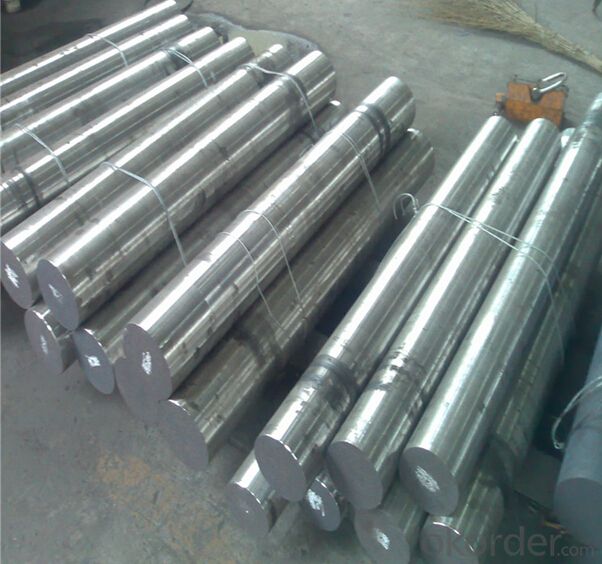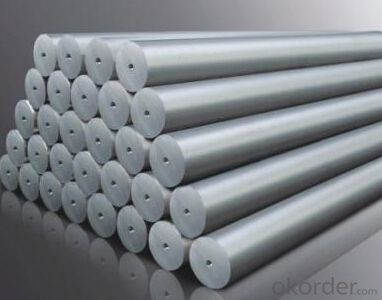Gr20Ni Bearing Steel of Special Steel CNBM
- Loading Port:
- Shanghai
- Payment Terms:
- TT OR LC
- Min Order Qty:
- 3 m.t.
- Supply Capability:
- 10000 m.t./month
OKorder Service Pledge
OKorder Financial Service
You Might Also Like
Item specifice
Product Description:
OKorder is offering Spring Precision and Compression with Stainless Steel at more competitive prices with stable quality. Our products have gained good reputation from all over world customer's, including America, Europ...etd
Chemical Composition:
Grade | AISI 52100, ASTM E52100, DIN 1.3505,JIS SUJ2, GCr15 |
| Length: 2000-13000mm or as required |
Shape | Round Bar |
Type | Alloy Steel Bar |
Delivery Condition | Black Surface |
Material | Bearing Steel |
Technique | Hot Rolled |
Applications:
Spring Precision and Compression with Stainless Steel are ideal for structural applications and are widely used in the construction of buildings and bridges, and the manufacturing, petrochemical, and transportation industries.
Product Advantages:
OKorder's Spring Precision and Compression with Stainless Steel are durable, strong, and resist corrosion.
Main Product Features:
· Premium quality
· Prompt delivery & seaworthy packing (30 days after receiving deposit)
· Corrosion resistance
· Can be recycled and reused
· Mill test certification
· Professional Service
· Competitive pricing


- Q:Can special steel be used in high-speed applications?
- Yes, special steel can definitely be used in high-speed applications. Special steel refers to a range of steel alloys that have been specifically developed and engineered to possess enhanced properties such as high strength, durability, and resistance to wear and corrosion. These properties make special steel suitable for various demanding applications, including high-speed ones. In high-speed applications, such as aerospace, automotive, machining, and power generation, the material needs to withstand extreme conditions, including high temperatures, vibrations, and mechanical stress. Special steel is designed to meet these requirements and provide excellent performance even under such challenging conditions. For example, high-speed steel (HSS) is a type of special steel that is specifically formulated to retain its hardness and strength at elevated temperatures, making it ideal for cutting tools like drills, end mills, and saw blades. Similarly, stainless steel variants like martensitic and precipitation-hardening stainless steels are commonly used in high-speed applications due to their high strength, toughness, and resistance to corrosion. Moreover, the development of advanced manufacturing techniques, such as powder metallurgy, has allowed the production of special steel with even better properties, including higher hardness, improved wear resistance, and superior dimensional stability. These advancements have further expanded the application range of special steel in high-speed industries. In summary, special steel is a versatile and reliable material that can be successfully employed in high-speed applications. Its unique properties make it suitable for withstanding the demanding conditions and providing excellent performance, making it a preferred choice for industries requiring materials that can withstand high speeds, temperatures, and mechanical stress.
- Q:What are the different surface hardening methods used for special steel?
- There are several surface hardening methods used for special steel, including carburizing, nitriding, induction hardening, flame hardening, and laser hardening.
- Q:Can special steel be used in the power generation equipment manufacturing industry?
- Yes, special steel can be used in the power generation equipment manufacturing industry. Special steel, also known as alloy steel, offers enhanced properties such as high strength, corrosion resistance, and heat resistance. These qualities make it suitable for various components in power generation equipment, including turbines, boilers, and generators, which often operate under extreme conditions. By using special steel, manufacturers can ensure the durability, efficiency, and reliability of the equipment, thus meeting the demanding requirements of the power generation industry.
- Q:What properties make special steel unique?
- Special steel, also known as alloy steel, possesses unique properties that set it apart from other types of steel. Firstly, special steel is distinguished by its exceptional strength and hardness. It is engineered to have a high resistance to deformation, making it suitable for applications that require robust materials. Whether in construction, automotive, or aerospace industries, special steel provides the necessary durability and reliability. Another remarkable property of special steel is its superior corrosion resistance. By incorporating certain alloying elements such as chromium, nickel, or molybdenum, this type of steel becomes highly resistant to rust and other forms of corrosion. As a result, special steel is often used in marine environments, chemical plants, and oil and gas industries where exposure to harsh conditions is prevalent. Furthermore, special steel demonstrates excellent heat resistance. It can withstand high temperatures without losing its strength or structure, making it suitable for applications in extreme heat environments, such as power generation or furnace components. This property allows special steel to be utilized in critical situations where other materials may fail or degrade. Special steel is also known for its versatility and adaptability. With various alloying elements and heat treatment processes, it can be tailored to meet specific requirements of different industries. This flexibility makes it possible to create specialized alloys with unique properties, such as improved machinability, wear resistance, or enhanced magnetic properties, catering to a wide range of applications. In conclusion, the properties that make special steel unique are its exceptional strength and hardness, superior corrosion resistance, excellent heat resistance, and its versatility in being tailored to specific requirements. These properties make special steel an invaluable material in numerous industries, enabling the development of innovative and reliable products.
- Q:What are the different methods of surface thermal spraying for special steel?
- There are several different methods of surface thermal spraying that can be used for special steel. These methods include: 1. Flame spraying: In this method, a flame or oxy-fuel source is used to melt the coating material, which is then sprayed onto the surface of the special steel. This method is commonly used for applying coatings such as zinc, aluminum, or their alloys. 2. Arc spraying: Arc spraying involves using an electric arc to melt the coating material, which is then propelled onto the surface of the special steel using compressed air. This method is often used for applying coatings such as stainless steel, nickel alloys, or copper. 3. Plasma spraying: Plasma spraying utilizes a plasma torch to heat and melt the coating material, which is then propelled onto the surface of the special steel. This method is particularly effective for applying coatings such as ceramic or metallic materials with high melting points. 4. High-velocity oxy-fuel (HVOF) spraying: HVOF spraying involves using a high-pressure combustion process to propel the coating material onto the surface of the special steel. This method produces coatings with high bond strength and density, making it suitable for applications requiring wear resistance or corrosion protection. 5. Detonation spraying: Detonation spraying utilizes a controlled detonation process to accelerate the coating material onto the surface of the special steel. This method is often used for applying coatings such as tungsten carbide or other hard materials, providing excellent wear resistance. Each of these methods of surface thermal spraying offers distinct advantages and is selected based on the specific requirements of the special steel application, including the desired coating material, thickness, and performance characteristics.
- Q:What are the requirements for special steel used in robotic applications?
- Optimal performance and reliability of robotic applications necessitates special steel that meets specific key requirements. These requirements encompass: 1. Exceptional strength: The steel utilized in robotic applications must possess outstanding strength properties to endure the stresses and loads encountered during robotic operations. It should exhibit superior tensile and yield strength to ensure structural integrity and prevent failure when subjected to heavy loads. 2. Resistance to wear: The steel employed in robotic applications should demonstrate high resistance to wear, enabling it to withstand repetitive motions, sliding, and abrasive contact with different surfaces. This characteristic minimizes wear and tear, thereby extending the lifespan of robotic components. 3. Protection against corrosion: Robotic applications often involve exposure to diverse environments, including moisture, chemicals, and other corrosive agents. Consequently, the special steel employed must possess excellent corrosion resistance to prevent degradation and maintain optimal performance over time. 4. Toughness: Good toughness is essential for special steel, allowing it to absorb energy and resist fracture or cracking. This attribute is crucial to ensure that the steel can withstand sudden shocks or impacts without catastrophic failure, thereby enhancing the safety and reliability of the robotic system. 5. Machinability: Robotic components often necessitate intricate shapes and precise dimensions. Therefore, the special steel used must exhibit good machinability, enabling easy cutting, shaping, and forming without excessive tool wear or manufacturing difficulties. 6. Heat resistance: Some robotic applications involve exposure to high temperatures, such as in welding or metalworking processes. Hence, it is imperative for the special steel to possess good heat resistance, maintaining its mechanical properties and structural integrity even under elevated temperatures. 7. Magnetic properties: Certain robotic applications may require non-magnetic steel to prevent interference with electromagnetic sensors or systems. Consequently, special steel with low magnetic permeability is often preferred for such applications. By fulfilling these requirements, special steel employed in robotic applications can deliver the necessary strength, durability, and performance essential for efficient and reliable robotic operations across various industries, including manufacturing, healthcare, and exploration.
- Q:How is high-strength steel used in the automotive industry?
- High-strength steel is widely used in the automotive industry for its ability to enhance the safety and performance of vehicles. It is used in various components such as the frame, chassis, and body structure to improve structural integrity, reduce weight, and provide better crash protection. Additionally, high-strength steel allows automakers to design vehicles with improved fuel efficiency and increased load-carrying capacity, making it a crucial material in modern automotive manufacturing.
- Q:What are the main alloying elements used in special steel?
- The main alloying elements used in special steel include chromium, nickel, molybdenum, vanadium, and tungsten.
- Q:Can special steel be used in the rubber manufacturing industry?
- Yes, special steel can be used in the rubber manufacturing industry. Special steel is often used to create molds, tools, and equipment that are used in the production of rubber products. It is valued for its strength, durability, and resistance to wear and tear, making it suitable for various applications in the rubber manufacturing process.
- Q:What are the different methods of surface electropolishing for special steel?
- There are several methods of surface electropolishing for special steel, including the use of acid-based or alkaline-based electrolytes, pulse current electropolishing, and reverse current electropolishing. The choice of method depends on factors such as the type of special steel being treated and the desired surface finish.
1. Manufacturer Overview |
|
|---|---|
| Location | |
| Year Established | |
| Annual Output Value | |
| Main Markets | |
| Company Certifications | |
2. Manufacturer Certificates |
|
|---|---|
| a) Certification Name | |
| Range | |
| Reference | |
| Validity Period | |
3. Manufacturer Capability |
|
|---|---|
| a)Trade Capacity | |
| Nearest Port | |
| Export Percentage | |
| No.of Employees in Trade Department | |
| Language Spoken: | |
| b)Factory Information | |
| Factory Size: | |
| No. of Production Lines | |
| Contract Manufacturing | |
| Product Price Range | |
Send your message to us
Gr20Ni Bearing Steel of Special Steel CNBM
- Loading Port:
- Shanghai
- Payment Terms:
- TT OR LC
- Min Order Qty:
- 3 m.t.
- Supply Capability:
- 10000 m.t./month
OKorder Service Pledge
OKorder Financial Service
Similar products
New products
Hot products
Related keywords



























